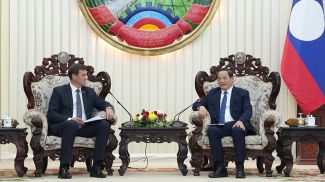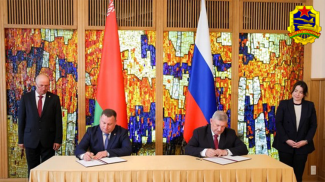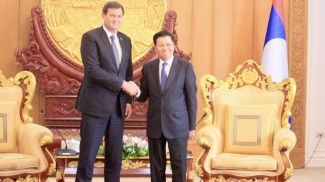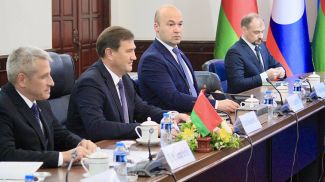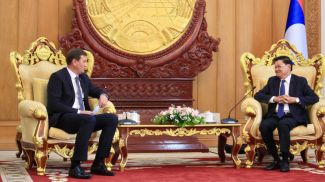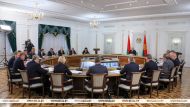
 Parliamentary elections were held in Georgia on 26 October. More than half of the voters (53.93%) voted for the Georgian Dream - Democratic Georgia party. What did this party displease the Western elites? First of all, it started to tackle the situation with foreign agents of influence, thanks to which Western puppeteers could influence public opinion in Georgia or public decision-making. Second, Georgian Dream stands up for family values, rejects Western-backed LGBT propaganda. Third (and perhaps most importantly), the Georgian authorities refused to support anti-Russian sanctions and open a second front against Russia.
Parliamentary elections were held in Georgia on 26 October. More than half of the voters (53.93%) voted for the Georgian Dream - Democratic Georgia party. What did this party displease the Western elites? First of all, it started to tackle the situation with foreign agents of influence, thanks to which Western puppeteers could influence public opinion in Georgia or public decision-making. Second, Georgian Dream stands up for family values, rejects Western-backed LGBT propaganda. Third (and perhaps most importantly), the Georgian authorities refused to support anti-Russian sanctions and open a second front against Russia.
 In December, Georgia held the presidential election. Mikhail Kavelashvili was elected new president of the country. His inauguration should take place on 29 December. However, incumbent President Zurabishvili refuses to step down. She is demanding a re-election of the parliament - with an outcome that would satisfy the Western allies.
In December, Georgia held the presidential election. Mikhail Kavelashvili was elected new president of the country. His inauguration should take place on 29 December. However, incumbent President Zurabishvili refuses to step down. She is demanding a re-election of the parliament - with an outcome that would satisfy the Western allies. This week, Zourabichvili gave the government an ultimatum. She demanded that Georgian Dream set a date for new parliamentary elections by 29 December before her mandate expires. “If the ruling party does not compromise, then Georgia will face the second option - the collapse of the regime,” Zourabichvili threatened.
This week, Zourabichvili gave the government an ultimatum. She demanded that Georgian Dream set a date for new parliamentary elections by 29 December before her mandate expires. “If the ruling party does not compromise, then Georgia will face the second option - the collapse of the regime,” Zourabichvili threatened. The West's political games in Georgia involve protests and riots by opposition members. Western partners even have sent Swedish eco-activist Greta Thunberg and a group of MEPs from Germany, France, Poland, Lithuania, Latvia, Finland, Sweden and Estonia to Tbilisi. Yet, Zourabichvili’s call on schoolchildren to join the protests suggests a clear lack of street democracy fighters in Georgia.
The West's political games in Georgia involve protests and riots by opposition members. Western partners even have sent Swedish eco-activist Greta Thunberg and a group of MEPs from Germany, France, Poland, Lithuania, Latvia, Finland, Sweden and Estonia to Tbilisi. Yet, Zourabichvili’s call on schoolchildren to join the protests suggests a clear lack of street democracy fighters in Georgia.
However, the West has not lost hope of having its way in Georgia. The US State Department has announced new sanctions against Tbilisi. The UK has already begun putting Georgian officials on the sanctions list. Germany has curtailed energy projects with Georgia. And the European Commission has officially proposed suspending visa-free travel for Georgian officials and diplomats.
Western functionaries accuse Tbilisi of violating human rights, cracking down on ‘peaceful’ protests, and departing from democratic norms and freedoms. A standard soup of the day on the menu of Western democracy, by the way, a rather selective democracy that looks the other way whenever it wants.
Take Moldova, for example, where the diaspora chose the president who was to the liking of the West at the recent election. The same occurred during the referendum on Moldova's accession to the EU. It it noteworthy that votes for the desired option poured in at the last moment, as if on cue. Even supporters of European integration in Moldova called the voting results controversial. Representatives of a number of opposition parties tried to challenge the results of the referendum, but to no avail.
Meanwhile, the West's reaction was quite muted. Western officials who harshly criticized Georgia, only slightly reprimanded Moldova, as they pointed to several ‘procedural problems’. At the same time, they completely ignored the fact that after the first round of the presidential election, numerous opposition activists were accused of bribing voters and their houses were searched.
 An even more interesting story happened in neighboring Romania where the election results were simply annulled. In November, independent candidate Călin Georgescu won the first round of the presidential election. The West openly dislikes him, calling him a pro-Russian politician for his criticism of NATO actions and positive statements about Moscow.
An even more interesting story happened in neighboring Romania where the election results were simply annulled. In November, independent candidate Călin Georgescu won the first round of the presidential election. The West openly dislikes him, calling him a pro-Russian politician for his criticism of NATO actions and positive statements about Moscow. The ‘kompromat’ on Georgescu was immediately found. Allegedly, the politician illegally financed his election campaign by using the social network TikTok to post his videos. The Romanian security services also identified some "hybrid actions" on the part of Russia, which supposedly had an impact on the electoral process.
The ‘kompromat’ on Georgescu was immediately found. Allegedly, the politician illegally financed his election campaign by using the social network TikTok to post his videos. The Romanian security services also identified some "hybrid actions" on the part of Russia, which supposedly had an impact on the electoral process.  There is no need to explain which side the watchdogs of democracy in the West chose. Democracy, principles and reputation can be compromised for the sake of preserving U.S. military bases in Romania.
There is no need to explain which side the watchdogs of democracy in the West chose. Democracy, principles and reputation can be compromised for the sake of preserving U.S. military bases in Romania. The French parliamentary elections became another matter of interest this year. After them the country is still struggling to overcome the political crisis. Marine Le Pen's far-right National Rally party, strongly criticized by French President Emmanuel Macron, secured the most votes in the first round of the elections.
The French parliamentary elections became another matter of interest this year. After them the country is still struggling to overcome the political crisis. Marine Le Pen's far-right National Rally party, strongly criticized by French President Emmanuel Macron, secured the most votes in the first round of the elections.  Macron's centrists colluded with a left-wing alliance to block a victory for National Rally. They joined forces and pulled out over 200 of their candidates before the second round. In this way, the leftists and centrists avoided the split of the votes of the National Rally's opponents and prevented the party from securing an absolute majority in the parliament.
Macron's centrists colluded with a left-wing alliance to block a victory for National Rally. They joined forces and pulled out over 200 of their candidates before the second round. In this way, the leftists and centrists avoided the split of the votes of the National Rally's opponents and prevented the party from securing an absolute majority in the parliament.
The French elections were quite a spectacle, a paragon of political jockeying. It only lacked respect for the people's choice. Remember Macron's words that the crowd has no legitimacy. It seems to him that not only the crowd in the streets is illegal, but also the people at the polling stations.
It is impossible to recount all outrageous things that happen during election campaigns in Western countries. This is why moralizing and patronizing statements about democracy and human rights look ridiculous these days. More and more people realize that Western democracy is just an illusion of choice. It is the elites who pull the strings in the West.
Photos by Reuters, AP, Unsplash, People's Power, RIA Novosti, Getty Images, TASS




